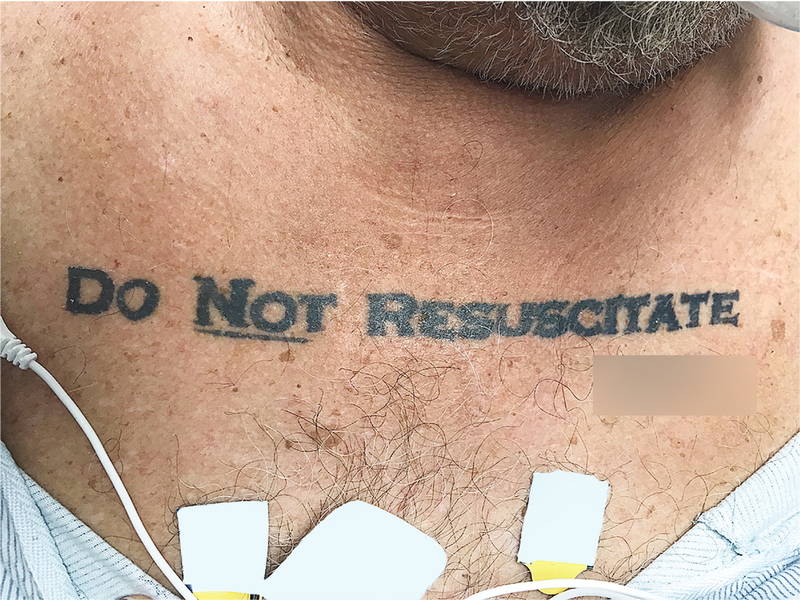
‘Do Not Resuscitate’ Tattoo On Unconscious Patient Leaves Florida Doctors Unsure What To Do.
Doctors in Miami’s Jackson Memorial Hospital faced an unusual ethical dilemma when an unconscious, dying patient was brought into the emergency room with a tattoo on his chest that read, “Do Not Resuscitate.”
The story of the 70-year-old man, who had a history of chronic obstructive pulmonary disease, diabetes mellitus and atrial fibrillation, is detailed in a case study published Thursday in the New England Journal of Medicine.
Unsure of the legality of following the tattoo’s instructions, hospital officials initially ignored the tattoo, but later called in an ethics consultant to provide some clarity on the matter.
“We initially decided not to honor the tattoo, invoking the principle of not choosing an irreversible path when faced with uncertainty,” the case study reads. “This patient’s tattooed DNR request produced more confusion than clarity, given concerns about its legality and likely unfounded beliefs that tattoos might represent permanent reminders of regretted decisions made while the person was intoxicated.”
Trying to buy themselves some time, doctors gave the patient a non-invasive oxygen mask, fluids and antibiotics while they awaited a decision from the consultant and looked for guidance in medical literature.
During this time, doctors became even more confused when they found a case of a man who had a “DNR” tattoo whose views had changed since getting inked. This particular case was that of a 59-year-old patient who had gotten the tattoo because he had “lost a bet playing poker,” the Washington Post reported. In this case, the man was conscious enough to tell officials that he did want life-saving measures to be taken.
Upon the consultant’s return, doctors were told to follow through with the DNR order.
“They suggested that it was most reasonable to infer that the tattoo expressed an authentic preference, that what might be seen as caution could also be seen as standing on ceremony, and that the law is sometimes not nimble enough to support patient-centered care and respect for patients’ best interests,” the study says.
Then a well-timed bureaucratic miracle occurred, helping clear consciences: Just as a DNR order was written for the tattooed man, officials, with the help of the social work department, found a written DNR order from the Florida Health Department. Officials were able to successfully match the signature on the man’s chest to that of the written order.
After all was said and done “the patient’s clinical status deteriorated throughout the night, and he died without undergoing cardiopulmonary respiration or advanced airway management,” the case stated.
Submitted as part of a end-of-life care scenarios to the journal, the case study’s authors noted that “this case report neither supports nor opposes the use of tattoos to express end-of-life wishes when the person is incapacitated.”













